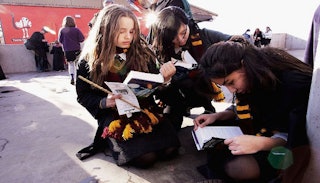Reading 'Harry Potter' Actually Makes Kids Better Humans, Says Science

New paper says reading Harry Potter can make kids more tolerant
There are two kinds of people in this world, those of us who are trying to gracefully accept that our Hogwarts letter got lost in the mail, and people who have never read the Harry Potter books.
If you’re one of those sad Muggles who doesn’t have a boxed set of the books stashed away for your kids to read once they’re old enough, a new paper in the Journal of Applied Psychology may change your mind. Turns out kids who read Harry Potter really are cooler than everyone else. The paper found kids who read the books and identify with Harry are more open-minded and less likely to be prejudiced against minority groups.
Instead of using a Pensieve, the paper looked at studies involving three different groups: fifth graders, high school students and college students.
Thirty-four Italian fifth graders were asked to fill out a questionnaire about immigrants, then split into two groups for six weeks. One group met and discussed passages from the books that dealt with themes of bigotry and prejudice (I’m guessing the insult Mudblood came up a lot). The other group served as a control and discussed neutral passages from the books (tips on the care of magical creatures perhaps?). After six weeks, the students in the group that discussed the deeper themes of the books who also identified personally with Harry Potter showed “improved attitudes towards immigrants.”
J.K’s Rowling’s wizarding world is full of rich, imaginative details, like how to mend broken bones without a cast or how a love potion will smell differently to each of us based on what we find attractive, there’s no question that the books have allegorical undertones.
Harry versus Voldemort is more than a good versus evil tale. While it’s magical and pretty, a class system very much exists in the wizarding world, both among the wizards themselves, and between the wizards and other magical creatures. It’s impossible to read passages about Voldemort’s obsession with pureblood wizards without thinking about Hitler’s Master Race ideology. And house-elfs are handy plot devices when the hero needs a quick getaway, but they’re also essentially slaves, with no way to gain their freedom unless granted it by their masters through the gift of clothing. Harry isn’t particularly clever (that’s Hermione’s job) but one of his defining characteristics is how he sees everyone — wizard, Muggle or creature — as equals. Reading the books and relating to Harry emotionally makes kids more likely to take on this characteristic themselves.
It’s not just children who better themselves by reading the books. In a separate study, 117 Italian high school students were asked their opinions about homosexuals. Then, in what they believed was a separate study, they were asked how many of the Harry Potter books they had read and if they identified with the main character. Similarly to the younger students, those who felt a connection to the boy with the lightning scar had more empathy for others. Relating to Harry on an emotional level meant the student was more likely to have a positive perception of LGBTQ people.
It even works with adults, although our ability to empathize with minorities tends to have less to do with how we connect with Harry Potter and more to do with how we feel about He-Who-Must-Not-Be-Named. In a study of UK college students, researchers found having less of an emotional identification with Voldemort lead to students having improved attitudes about immigrants. In other words, the less we sympathize with The Dark Lord, the less like him we are.
So the next time someone rolls their eyes when you tell them how you can’t wait to read the books with your kids, just tell them the truth: the Harry Potter books have actual magical powers.